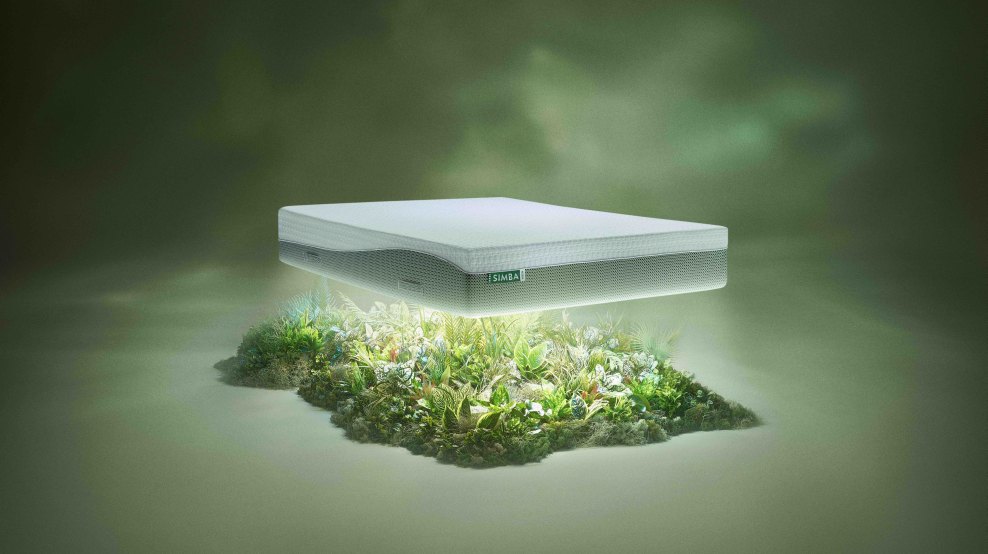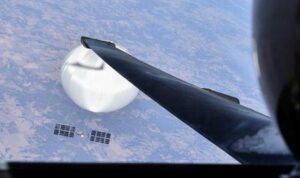Did you know that mattresses are a global environmental nightmare? Every year, the United States throws away 18.2 million mattresses, according to a report from The Guardian. However, the US only has 56 facilities available to recycle them, further increasing the number of mattresses that end up in landfills across the country.
The situation is not any better across the pond. In 2017, for example, the UK threw away more than 7 million mattresses, the vast majority of which went straight to landfill. But one climate-conscious tech startup is slowly changing that with sustainable and non-toxic mattresses that are made with materials that are not harmful to the environment.
Enter Simba, a London-based sleep technology startup founded in 2016 that manufactures sustainable mattresses that are 100% recyclable. Simba said its mattresses use “biodegradable, organic latex alongside our recyclable Aerocoil springs and GRS standard, recycled hollow fibers to give it the very best sustainable credentials.” Since its inception seven years ago, Simba has sold over 50 million mattresses in over 35 countries.
Today, Simba announced it has become the first British-born sleep brand to be granted the coveted internationally recognized ethical accreditation of B Certified Corporation. The award marks a major milestone on Simba’s road to achieving net zero by 2030.
The award is a testament to Simba’s ambition to become a Certified B Corporation® just last year (2022), as part of its wider business strategy focused on three key pillars: Health, Planet, and People.
Explaining what measures were taken to reach this milestone, CEO and founder Steve Reid said: “Successful submissions need to score 80 or higher to pass B Corp™ status. Simba received 97.5 in the assessment of its environmental and social impact – an achievement of which we are incredibly proud. B Corp™ involves a rigorous process that placed our entire business model under the microscope – from a deep dive into our supply chain to review our approach to ethical innovation in new product development.”
Reid added: “In addition to the environment, accreditation also involves scrutinizing governance and areas such as worker wellness and development, diversity, customer stewardship, and community-related charitable projects. We set up an internal team and through this journey, we’ve implemented lots of changes across the organization. But there is still work to be done.”

“Sleep deprivation creates an enormous strain on personal lives, business, and wider infrastructure such as the NHS. Simba’s mission is to engineer the perfect night’s sleep in a way that creates as little impact on the planet as possible. It is also dedicated to giving accessible sleep solutions to more people.
“By helping to solve common sleep problems and improving access to quality sleep to as many as possible – using a combination of new technology, as well as full price and refurbished products – we feel this is Simba’s way of helping towards this.”
Simba mattresses are manufactured in the UK in zero-waste factories, meaning transport miles are reduced thanks to a short logistics chain. Nothing is sent to a landfill, and all manufacturing waste is recycled or reprocessed into other products.
As part of Simba’s zero waste commitment and sustainability goals, in March 2023, the sleep technology business will launch its state-of-the-art, not-for-profit recycling service to accept any brand of mattress, no purchase necessary.
When it comes to environmental challenges, Simba already uses carbon offsets for logistics – but the long-term aim is to reduce reliance on offsetting by reducing the emissions at source.
“Product is the single largest contributor to emissions and Simba has been working hard to reduce environmental impact through innovation, such as the launch of the Green Organic mattress which uses GOTS-certified organic cotton and GOLS-certified organic latex,” says Reid.
“As well as with upcoming designs that will enable us to slim down the use of foam in our mattress layers, Simba duvets use Global Recycled Standard fillings whilst Better Cotton is used across the entire Simba range”.
Simba accessories are made in Eco Factories and manufactured with energy from certified renewable sources, plus they are accredited with ISO 14001, which means the environmental impact is monitored, benchmarked, and controlled with energy and water reduced.
In addition to sustainability credentials and goals, Simba is committed to fostering a culture of well-being and supporting communities both within the company and further afield.
The sleep tech firm is a founding partner of GenM, the menopause partner for brands, and will be helping them to better serve menopausal women with the right products and services to ease night-time symptoms. The company’s NHS scheme offering a generous discount on all Hybrid mattresses, bedding, pillows, duvets, and sheets has seen over 43,000 healthcare workers get a better night’s sleep since it launched in 2020.
Simba believes a good night’s sleep is the bedrock of building a stable and successful life.
“Our partnership with charity End Youth Homelessness recently passed its one-year anniversary. In this time, we’ve donated nearly £300,000 worth of mattresses and bedding to newly rehomed people across the UK” continues Reid. “In 2022, Simba was named the 3rd Best Retail Company to work for in the Best Companies’ league table [as voted for by staff].
“Being a certified B Corp™ is a positive step for the company long term. Reviewed every three years it will shape our roadmap for continuous improvement. It also provides additional accountability. “By the end of 2023, we’d like to ensure at least 50% of materials used are from recycled sources. And have a goal to reduce the carbon footprint of foam in our mattresses by 25% by 2050.”
- SEO Powered Content & PR Distribution. Get Amplified Today.
- Platoblockchain. Web3 Metaverse Intelligence. Knowledge Amplified. Access Here.
- Source: https://techstartups.com/2023/03/03/climate-conscious-sleep-tech-startup-simba-becomes-the-first-uk-born-sleep-brand-to-be-awarded-certified-b-corporation/
- 000
- 2016
- 2017
- 2020
- 2022
- 2023
- 7
- a
- Accept
- access
- accessible
- accessories
- According
- accountability
- accreditation
- accredited
- achievement
- achieving
- across
- added
- addition
- Additional
- All
- alongside
- already
- ambition
- and
- Anniversary
- announced
- approach
- areas
- assessment
- available
- award
- awarded
- become
- becomes
- believes
- benchmarked
- BEST
- Better
- body
- brand
- brands
- Building
- business
- business model
- carbon
- carbon footprint
- ceo
- CEO and Founder
- Certified
- chain
- challenges
- Changes
- changing
- Charity
- combination
- commitment
- committed
- Common
- Communities
- company
- Company’s
- continues
- continuous
- contributor
- controlled
- CORPORATION
- country
- coveted
- creates
- Credentials
- Culture
- customer
- dedicated
- deep
- deep dive
- designs
- Development
- Discount
- Diversity
- down
- Emissions
- enable
- energy
- engineer
- enormous
- ensure
- Entire
- Environment
- environmental
- ethical
- Every
- example
- factories
- fibers
- Firm
- First
- Foam
- focused
- Footprint
- fostering
- Founded
- founder
- founding
- from
- full
- further
- generous
- get
- Give
- Giving
- Global
- goal
- Goals
- good
- governance
- granted
- Green
- guardian
- Hard
- harmful
- Health
- healthcare
- helping
- higher
- homelessness
- However
- HTTPS
- Hybrid
- Impact
- implemented
- improvement
- improving
- in
- inception
- increasing
- incredibly
- Infrastructure
- Innovation
- internal
- internationally
- ISO
- IT
- journey
- Key
- Know
- largest
- Last
- Last Year
- launch
- launched
- layers
- League
- Life
- LINK
- little
- Lives
- logistics
- Long
- long-term
- made
- major
- Majority
- manufactured
- manufacturing
- many
- March
- materials
- meaning
- means
- measures
- Microscope
- milestone
- million
- Mission
- model
- monitored
- more
- Named
- nearly
- necessary
- Need
- net
- New
- new product
- NHS
- number
- offering
- ONE
- organic
- organization
- Other
- part
- partner
- Partnership
- passed
- People
- perfect
- personal
- planet
- plato
- Plato Data Intelligence
- PlatoData
- plus
- POND
- positive
- possible
- price
- problems
- process
- Product
- product development
- Products
- Products and Services
- projects
- proud
- provides
- purchase
- quality
- reach
- received
- recently
- recognized
- recycling
- reduce
- Reduced
- reducing
- reliance
- Renewable
- retail
- review
- reviewed
- rigorous
- road
- roadmap
- Said
- says
- scheme
- serve
- service
- Services
- set
- seven
- Shape
- Short
- since
- single
- situation
- sleep
- Slowly
- Social
- Social impact
- sold
- Solutions
- SOLVE
- Source
- Sources
- stable
- Staff
- standard
- startup
- state-of-the-art
- States
- Status
- Step
- Steve
- Stewardship
- Still
- straight
- Strategy
- Submissions
- successful
- such
- supply
- supply chain
- Supporting
- Sustainability
- sustainable
- Symptoms
- table
- team
- tech
- tech startup
- Technology
- testament
- The
- The Guardian
- the UK
- three
- Through
- time
- Title
- to
- towards
- transport
- Uk
- under
- United
- United States
- upcoming
- us
- use
- Vast
- voted
- Waste
- Water
- Wellness
- What
- which
- Whilst
- wider
- will
- within
- Women
- Work
- worker
- workers
- working
- worth
- year
- years
- youth
- zephyrnet
- zero












